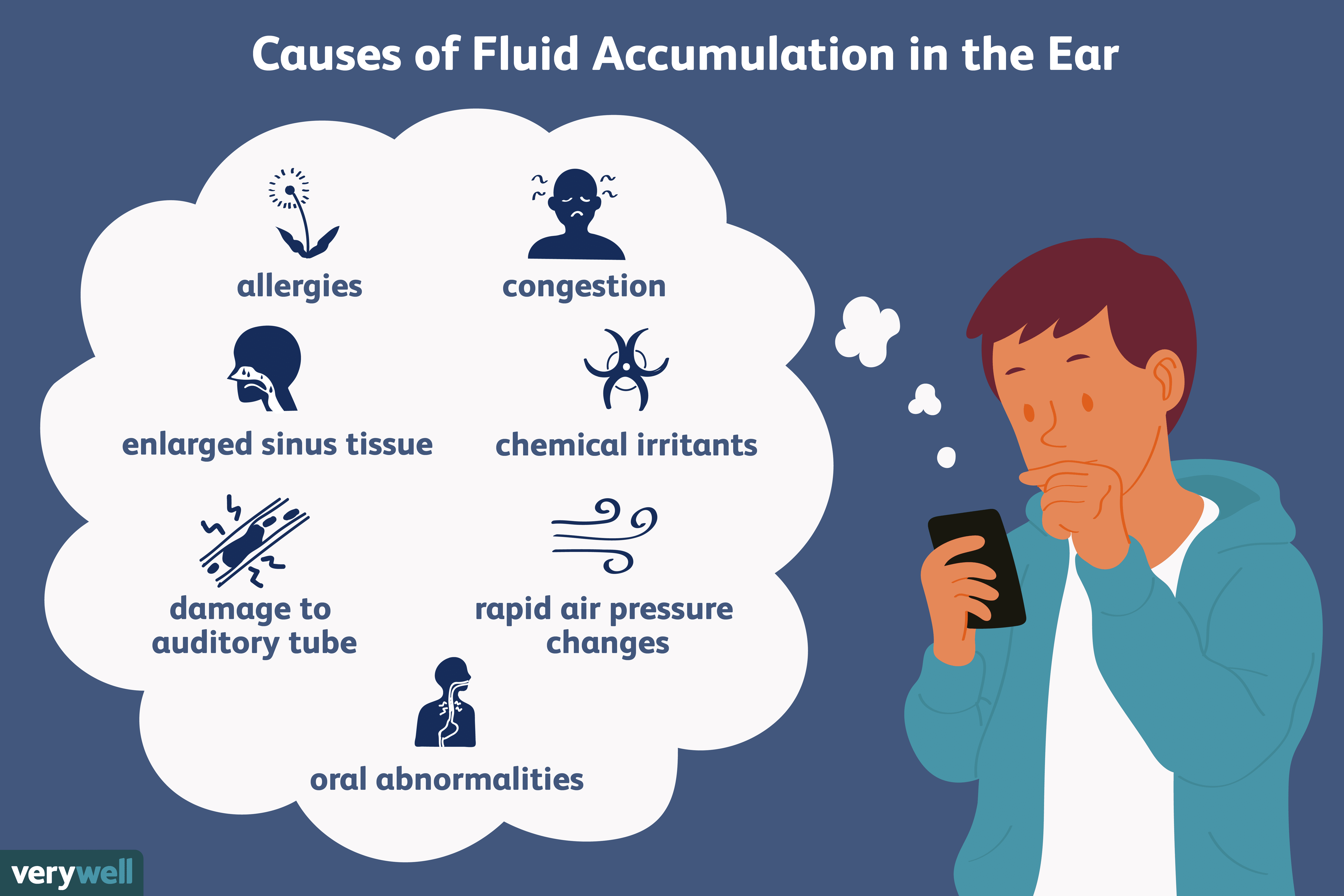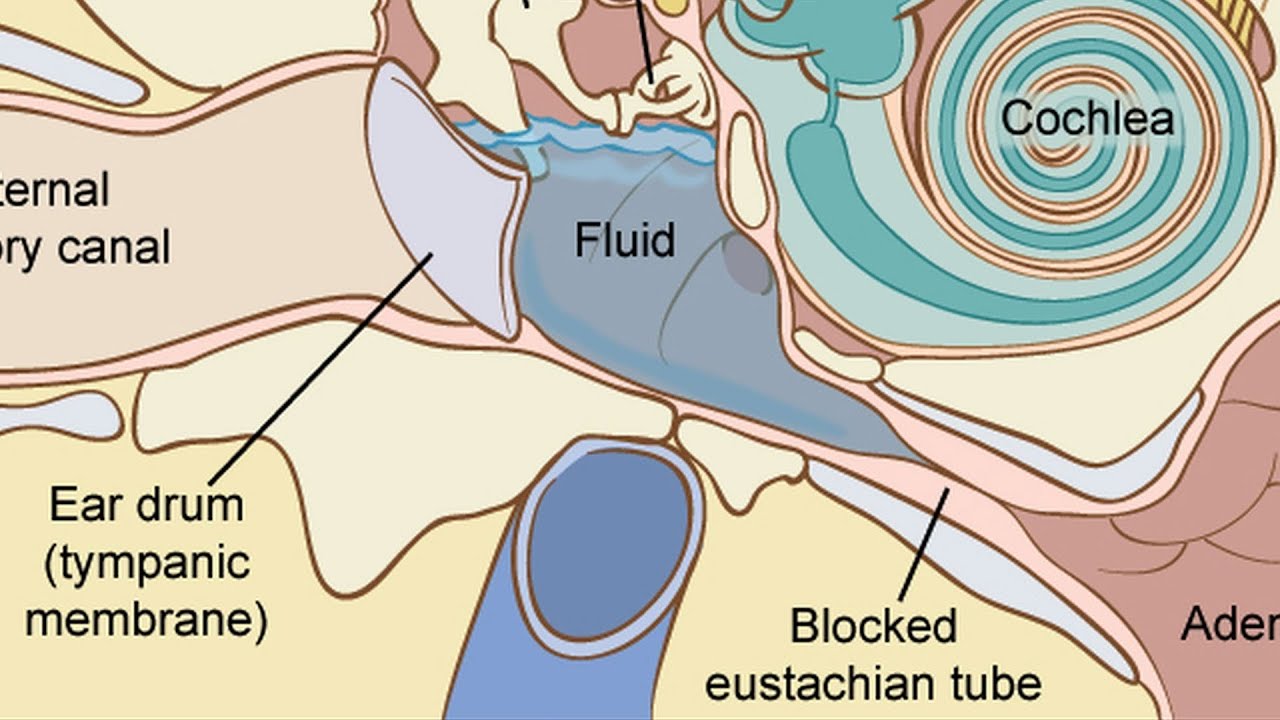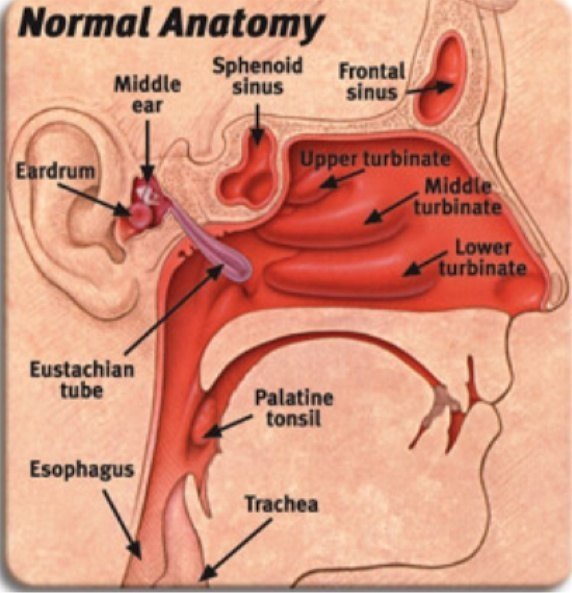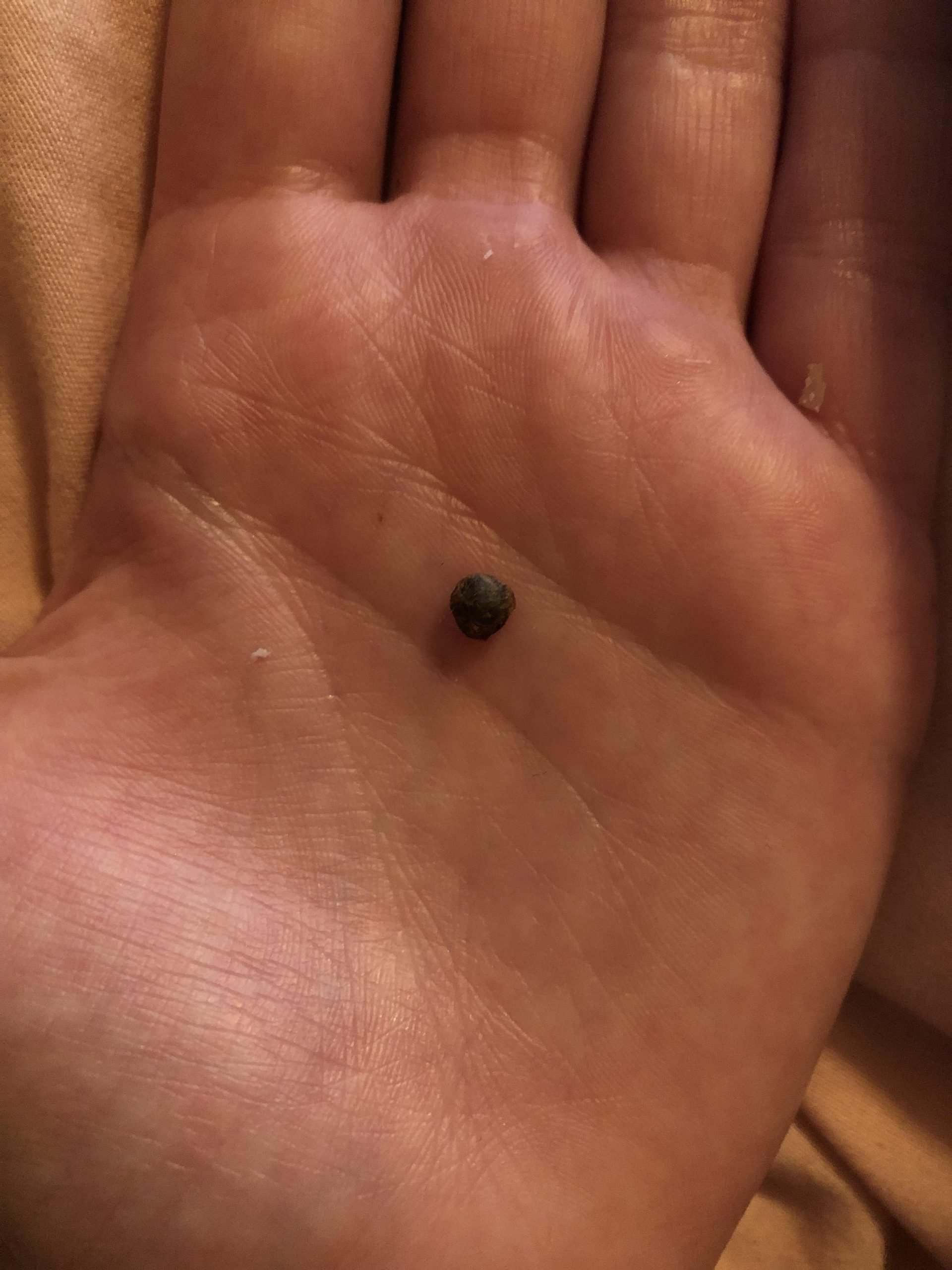What Is Otitis Media With Effusion
Otitis media is a;generic;term that refers to an;inflammation;of the middle ear. The middle ear is the space behind the eardrum. Otitis media with;effusion;means there is fluid in the middle ear, without an infection.
Fluid in the middle ear can have few symptoms, especially if it develops slowly. It almost always goes away on its own in a few weeks to a few months. So, this kind of ear problem doesnt usually need to be treated with antibiotics. Your doctor may decide to treat it if it causes a painful;infection;or if the fluid doesnt go away.
Otitis media with effusion is most common in young children, age 2 and under. But it can affect people of any age.
How Are Blocked Eustachian Tubes Treated
Blocked eustachian tubes often get better on their own. You may be able to open the blocked tubes with a simple exercise. Close your mouth, hold your nose, and gently blow as if you are blowing your nose. Yawning and chewing gum also may help. You may hear or feel a “pop” when the tubes open to make the pressure equal between the inside and outside of your ears.
If you have allergies, the doctor may prescribe a steroid medicine that you spray into your nose. Decongestants that you take by mouth or spray into your nose may be helpful. You may need antibiotics if you have an ear infection.
A warm washcloth or a heating pad set on low can help with ear pain. Put a cloth between the heating pad and your skin so you don’t burn your skin.
In some cases, people need surgery for a blocked eustachian tube. The doctor makes a small cut in the eardrum to drain fluid and to make the pressure the same inside and outside the ear. Sometimes the doctor will put a small tube in the eardrum. The tube will fall out over time.
How Is Swimmer’s Ear Treated
Treatment depends on the severity of the infection and how painful it is. A health care provider might prescribe ear drops that contain antibiotics to fight the infection, possibly mixed with a steroid to reduce swelling of the ear canal. Ear drops are usually given several times a day for 7 to 10 days.
If swelling of the ear canal makes it hard to put in the drops, the doctor may insert a wick into the canal to help carry the medicine inside the ear. In some cases, the doctor may need to remove pus and other buildup from the ear with gentle cleaning or suction. This lets the ear drops work better.
For more severe infections, oral antibiotics might be prescribed, and the health care provider might want to run tests on discharge from the ear to find which bacteria or fungi are causing the problem.
Over-the-counter pain relievers often can manage ear pain, but a prescription pain medicine may be needed if it’s severe. Once treatment starts, your child will start to feel better in a day or two. Swimmer’s ear is usually cured within 7 to 10 days of starting treatment.
Don’t Miss: How To Connect Phonak Hearing Aids To Iphone
Otitis Media In Adults
Otitis media is another name for a middle ear infection. It means an infection behind your eardrum. This kind of ear infection can happen after any condition that keeps fluid from draining from the middle ear. These conditions include allergies, a cold, a sore throat, or a respiratory infection.
Middle ear infections are common in children, but they can also happen in adults. An ear infection in an adult may mean a more serious problem than in a child. So you may need additional tests. If you have an ear infection, you should see your healthcare provider for treatment. If they happen repeatedly, you should see an otolaryngologist or an otologist .
What are the types of middle ear infections?
Infections can affect the middle ear in several ways. They are:
Who is more likely to get a middle ear infection?
You are more likely to get an ear infection if you:
- Smoke or are around someone who smokes
- Have seasonal or year-round allergy symptoms
- Have a cold or other upper respiratory infection
What causes a middle ear infection?
The middle ear connects to the throat by a canal called the eustachian tube. This tube helps even out the pressure between the outer ear and the inner ear. A cold or allergy can irritate the tube or cause the area around it to swell. This can keep fluid from draining from the middle ear. The fluid builds up behind the eardrum. Bacteria and viruses can grow in this fluid. The bacteria and viruses cause the middle ear infection.
Your Earwax Is Very Flaky

Do not worry, flaky earwax isnt a sign of infection. It is, however, something that happens as you grow older. When someone ages, their body gets a little dryer including the glands that produce earwax. As a result, their ears get a little itchy. Adding a few drops of mineral oil to the ear canal can ease that discomfort and soften the earwax at the same time.
What if your ears have no earwax at all? Its rare, but it does happen. It is a condition called keratosis obturans, and it means there is a hard plug where the earwax comes out. Its unclear why this happens, but researchers do know that the plug is made of keratin, a protein that exists in skin cells. You might feel pain in that ear and have trouble hearing. The treatment is simple, let a doctor pull the plug out. In some, the condition is chronic, and the patient requires regular medical care.
Earwax, who knew it was so interesting. Why not take a look at yours to see its trying to say..
Don’t Miss: How Much Compensation Do You Get For Hearing Loss
Ear Candling Has No Scientific Proof
Eric Mann, M.D., Ph.D., clinical deputy director of the FDAs Division of Ophthalmic, Neurological and Ear, Nose and Throat Devices, said the FDA believes there is no valid scientific evidence for any medical benefit from their use. Charles W. Beatty, M.D., of the Mayo Clinic said the research indicates ear candling is ineffective at removing earwax and can, in fact, push earwax deeper into the ear canal. Studies of the debris that remain inside the cones after a treatment are actually a combination of burned candle wax and fabric instead of impurities removed from your ear.
Studies of the debris that remain inside the cones after a treatment are actually a combination of burned candle wax and fabric instead of impurities removed from your ear.
How Do You Remove Water Stuck In Your Ear
Tugging on the earlobe and shaking your head should help water flow out of the ear canal, or you can create a vacuum with the palm of your hand. Using a solution that’s 50% rubbing alcohol and 50% white vinegar after swimming can also dry the ear canal and may prevent infections caused by swimmers ear.
Read Also: How To Learn Sign Language Words
Dont Let Itchy Ears Prevent You From Wearing Your Hearing Aids
Itchy ears can be annoying, but they shouldnt prevent you from wearing your hearing aids as prescribed. So often this condition is easily resolved, leaving you free to be part of every;conversationno matter what people happen to be saying.
If your hearing aids are causing;problems or if you aren’t hearing your best, schedule an appointment with a hearing care professional. For a complete list of hearing centers in your community, visit our online directory of consumer-reviewed clinics.
Protect Your Ears From Injury
The ears are delicate, which is why it is important to be careful about at-home remedies. Never put your finger, ear swabs, or other objects in the ear canal. Placing objects into the ear can cause the problem to worsen for several reasons:
- Introducing bacteria that could increase the risk of an ear infection
- Push the water so it moves deeper into the ear
- Injure the ear canal
- Puncture the eardrum
If you often have ear problems after swimming, a few preventive steps can be followed. Try using a swim cap or earplugs when you are in the water. Additionally, be thorough about drying the outside of the ear after swimming or showering.
Also, be aware that sweating while wearing earbuds can also lead to moisture problems within the ears if the sweat is trapped. If you are sweating, it is best to remove the earbuds.
Also Check: What Is Good For Ear Infection
What Is Ear Fullness
Ear fullness is the feeling that your ears are clogged, stuffed or congested when yawning, swallowing, or other usual methods for eliminating this sensation have failed to work. You may experience muffled or slightly impaired hearing as a result.
Ear fullness accompanied by cold and is typically caused by a blocked Eustachian tube, which connects your ear to your throat and permits the drainage of fluid from your middle ear. If fluid builds up, it can cause the middle ear to become infected with bacteria or viruses, causing pain and swelling.
Sudden, dramatic shifts in air pressure, such as those experienced when flying in an airplane or scuba diving, may cause fullness in the ear or even rupture of the eardrum. This is known as barotrauma and occurs from extreme pressure differences between the inside of your ear and the outside.
Although ear fullness often results from congestion due to the and will resolve with self-treatment, certain symptoms may indicate a more serious condition. Seek immediate medical care if your symptoms persist after three to four days or are accompanied by a very high , severe pain, swelling and redness of the skin surrounding the ear, or drainage of pus from the ear.
Sudden Hearing Loss As An Initial Symptom
Based on published case reports, it appears that sudden;hearing loss is rarely a symptom of coronavirus onset.
In a June 2020;report, several Iranian;patients reported hearing loss in one ear, as well as vertigo. In another report about;sudden sensorineural hearing loss and COVID-19,;one Egyptian man with no other coronavirus symptoms developed sudden hearing loss, and then tested positive for coronavirus.
But beyond those reports, not much has been published by researchers.;
Note:;Sudden hearing loss is a medical emergency. Seek medical attention if you experience sudden hearing loss in one ear. The faster you get treatment, the more likely you’ll get your hearing back.
Recommended Reading: Can Pool Water Cause An Ear Infection
Dissolve Wax With Hydrogen Peroxide
If you feel like you’ve got a buildup of wax as well as trapped water in your ear, Dr. Jethanamest recommends using a dropper to insert hydrogen peroxide solution into the ear canal. “The hydrogen peroxide can sometimes loosen or dissolve the wax and help get rid of the water trapped in the ear canal,” he explains.
You can get eardrops online or over-the-counter that combine urea and hydrogen peroxide, known as carbamide peroxide, to dissolve earwax.
However, don’t use this method if you have an outer ear infection, perforated eardrum, or tympanostomy tubes .
How Can I Help My Child Feel Better

Ear infections should be treated by a doctor. If not, the ear pain will get worse and the infection may spread. At home, acetaminophen or ibuprofen may ease discomfort.
Follow the health care provider’s instructions for using ear drops and oral antibiotics, if they are prescribed. It’s important to keep water out of your child’s ear during the entire course of treatment. You can use a cotton ball as an earplug to protect your child’s ear from water during showering or bathing.
Don’t Miss: How To Get Hard Wax Out Of Ear
How Do You Prevent Swimmer’s Ear
The best way to reduce the chances of getting swimmers ear is to take some easy precautions:
- Dont insert anything into ears, and especially avoid the use of cotton swabs to clean ears.
- The use of a hairdryer on the lowest setting can be used to alleviate moisture in the ear.
If you or your child develops swimmers ear, your summer fun doesnt have to end. Seeing your physician;or a hearing care professional to get treatment started right away will not only ease your discomfort, it will get you back in the water in no time. To find a clinic near you, visit our consumer-reviewed directory.;
When It Feels Like Your Ear Is Wet All The Time
To be honest, this isnt really earwax, but it is understandable that you might think it is cerumen. Wet ears typically mean disease, most likely infection. Ear infections create pus, so that might be why your ear feels wet. That is not the only possible cause, though.
It is also possible that you have a type of skin growth inside your ear canal called a cholesteatoma. A cholesteatoma is a lot like a cyst, but one that appears inside the ear blocking the canal. When that happens, stuff like earwax and dirt build up. This blockage can cause debris to overflow and come out the ear. Any drainage from your ear means you need to see a doctor and find out why that is happening.
You May Like: How To Set Up Signia Hearing Aids
Earwax That Smells Bad
Earwax with a bad smell means you need to pay attention. The change in odor typically indicates a rather serious infection. Anaerobic bacteria, in other words, bacteria that do not require oxygen to survive, tend to emit a foul odor that will make earwax stink.
That bad smell can also mean there is an infection causing middle ear damage. You might feel like your balance is off and hear a ringing or other phantom noise in the affected ear. You need to make an appointment with your doctor.
In 2009, a group of Japanese scientists also linked stinky earwax to a gene that might cause breast cancer. It will take more studies to prove this theory but, its worth talking to your doctor about if breast cancer runs in the family.
How Do I Get Water Out Of My Ears
Contributed by Debbie Clason, staff writer, Healthy HearingLast updated May 11, 20202020-05-11T00:00:00-05:00
Playing in the water can be fun for people of all ages. While summer is a great time to enjoy swimming to its fullest, all of the splashing around can occasionally lead to water getting trapped in your ears.;Symptoms include a feeling of fullness in the ear canal;and a sensation that water is jostling around in your ear. It can happen in one or both ears.;
Sometimes tilting your head to the sideis all it takes to remove water in your ears.
When the water doesnt trickle out on its own, it may lead to a case of otitis externa, an ear infection also known as swimmers ear.
Recommended Reading: Can An Ear Infection Make Your Scalp Hurt
A Very Common Problem
Swimmers ear, also known as otitis externa, affects;millions of people every year. The numbers rise in the summer, with nearly half of cases occurring between June and August. Though mostly associated with childrenas they are more susceptible due to narrower ear canalsswimmers ear can affect people of any age. It also occurs five;times more often in swimmers than in the general population.
Even the nickname swimmers ear is somewhat of a misnomer; although common to swimmers, you dont have to be a swimmer to get it. Sometimes just living in a hot and humid climate is enough for moisture to build up and become trapped.
Water that stays in the ear after swimming or even showering, if you don’t get all of the moisture out and get it good and dry, then it can lead to swimmer’s ear.”
“Bacteria proliferate in a warm, moist environment,” said Bridget Redlich, infection preventionist at Lake Charles Memorial Health System in Louisiana. Water that stays in the ear after swimming or even showering, if you don’t get all of the moisture out and get it good and dry, then it can lead to swimmer’s ear.”
How Is Otitis Media With Effusion Diagnosed
If you think your child may have otitis media with effusion, make an appointment your childs doctor. He or she will look in your childs ears. They will look at the eardrum for signs that there may be fluid behind it. They may order a test called tympanometry. It can diagnose otitis media with effusion. It can also help tell the amount and thickness of the fluid that is trapped. They may also want to do a hearing test on your child.
You May Like: How Many People In The Us Have Hearing Loss
A Protective Mechanism To Avoid Ear Damage
Hearing a rumbling sound in your ear is often a protective mechanism by your body. Sometimes, noises can be too loud and have the potential to damage your hearing.
The ear reduces this risk by contracting muscles inside the inner ear that reduce or muffle the sounds. Doctors call these muscles the tensor tympani.
These muscles work to pull the malleus in the ear away from the eardrum. As a result, the eardrum isnt able to vibrate as much as usual. This creates a dampening effect in the ear, which can create a rumbling sound.
You may notice this occurring when you:
- chew
Not everyone hears or observes a rumbling sound when they perform these activities, but some do.
Finding The Right Ms Doctor

My primary care physician referred me to a doctor at an affiliated hospital. After waiting a month for an appointment, that first doctors visit was awful. He gave me binders full of drug information and didnt answer any of my questions. I left the hospital in tears.
I had encountered four different people who had the exact same story. One person, a nurse who took care of me in the hospital, told me how he had gone to four different neurologists and ended up with one he loves. I finally made it to that doctor, and the people I talked to were absolutely right.
Recommended Reading: Can Ringing In Your Ears Cause Dizziness
Preventing Bugs In Your Ears
Getting a bug in your ear is more likely to occur if you have close contact with animals, or if you sleep outdoors.
If you think or suspect there is a bug in your ear, getting it out quickly is important. Bugs, such as ticks, can carry disease.
Like any foreign object that gets lodged in your ear, a bug can also irritate the cranial nerves that transmit information to the brain.
If a bug enters your ear, it is more likely to die or exit on its own than it is to stick around. If youre concerned about getting a bug in your ear, covering up your ears is the best way to prevent it from happening.
It’s Actually A Skin Infection
Swimmers ear is an infection of the skin of the ear canal, and it can be excruciatingly painful.
The infection enters the ear through bacteria found in water. All water contains bacteria, and the levels are even higher in non-treated water;found in lakes, rivers and oceans. When this bacteria-laden water doesnt drain properly from the ear canal, it becomes trapped. In the warm, moist environment of the ear canal, the bacteria multiply and cause an infection. The infection causes swelling and inflammation;;not a good turn of events in a tight space such as an ear canal. The ear canal simply cannot accommodate the swelling;and the resulting pain can be excruciating.
You May Like: How Do You Say Here In Sign Language
Hearing Loss As Later Symptom
What does appear to be a little more common is developing hearing loss, tinnitus or dizziness;later in the infection process, meaning these issues are;not part of the initial onset of symptoms but develop days to weeks later.;
A February 2021;systematic review;that pooled together data on;auditory complications;estimated that:
- 7.6% of people report;hearing loss
- 14.8% report;tinnitus
- 7.2% report;vertigo
However, the researchers emphasize that there is a lack of;”high-quality studies” on this topic. A large comprehensive research effort;is needed.
How To Remove Water In Ear After Swimming Immediately
While swimming, water can get into your ears, you do not have to wait until you get home to remove it. Instead, try the various steps or remedies which employ gravity, help in stretching ear canal, or pushes eardrum outwards. Some of these simple steps to remove water stuck in your ears include:
Recommended Reading: Does Medicare Cover Hearing Aids In Washington State
Apply Pressure/create A Vacuum
Sometimes, gravity isnt enough. Another way to get rid of fluid in the ears is by using pressure and creating a vacuum in your ear canal. With your head tilted to the side, you can press, push, or cover your ear with your hand, which will help create a vacuum. Remove your hand quickly, and the trapped water may drain. As well, gently tugging on your earlobe can sometimes open up your ears enough to allow the water to come out.
Is It Normal To Have Fluid Drain From Your Ear
Earwax that drains from your ear is normal. This can be white, yellow, or brown and may be runny. Only a small amount should drain from the ear, though. If discharge continues or if you see signs of blood or pus, it may indicate your eardrum has been ruptured. That’s not normal, and you should contact your doctor.
Read Also: Why Does My Child Get Recurrent Ear Infections
What Are The Symptoms Of Secretory Otitis Media
-
A feeling of fullness in your ear
-
A popping or crackling sound when you swallow
-
Some hearing loss
-
Sometimes, loss of balance
If young children have secretory otitis media with hearing loss for a long time, they can have trouble learning how to speak. Secretory otitis media also raises the risk of getting more ear infections .
Gently Pull On The Ear
 THAIPOLICEPLUS.COM” alt=”I feel like i have something in my ear > THAIPOLICEPLUS.COM”>
THAIPOLICEPLUS.COM” alt=”I feel like i have something in my ear > THAIPOLICEPLUS.COM”> Another simple way to get water out of your ear is to gently tug on your earlobe toward the back or downward, Dr. Jethanamest says. “This can often move the cartilage of the ear canal, making it straighter to encourage the water roll out,” he explains. “Physicians gently pull on the ear this way when we want to examine the ear and tympanic membrane.”
While you’re doing this, you could also gently shake your head from side to side.
RELATED: Your Ultimate Guide to Healthy Ears
You May Like: How To Say Have A Good Day In Sign Language